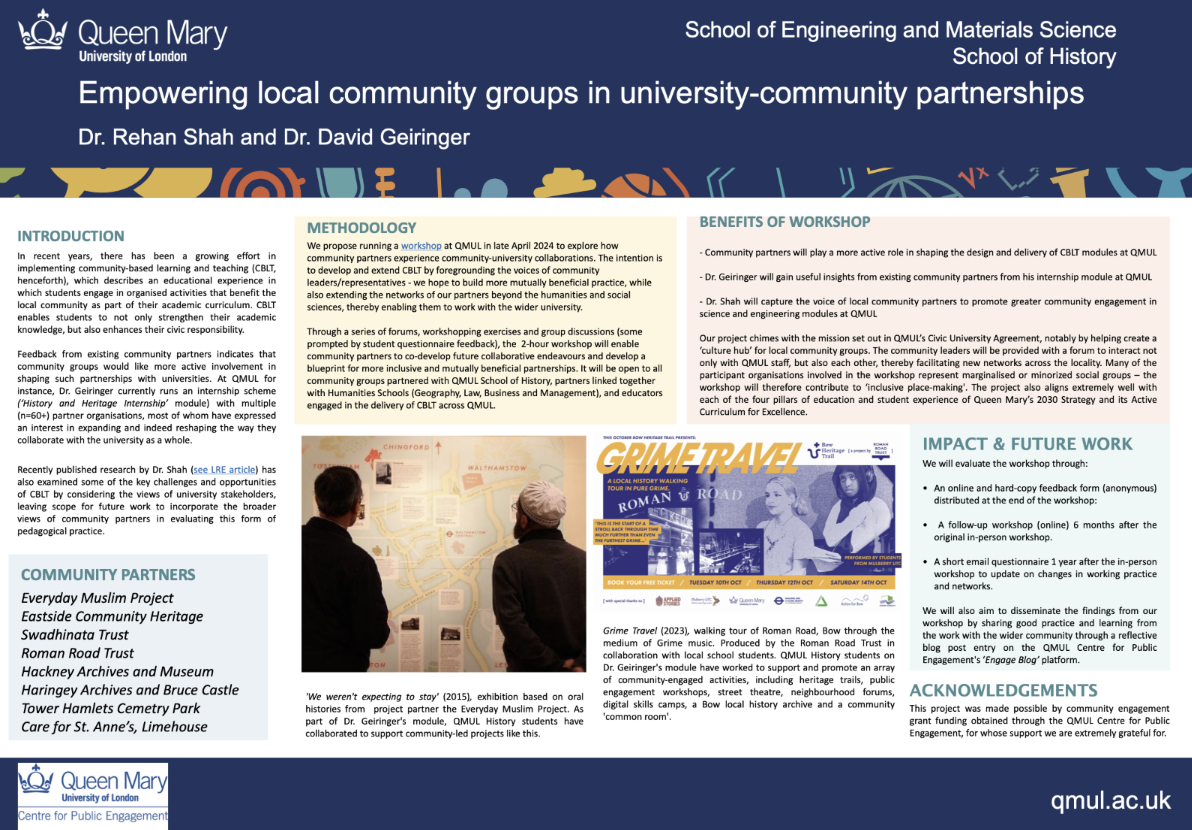Locating communities in community-based learning: empowering local community groups in university-community partnerships.
Welcome to the first post of our Engagement Blog for the 2024-25 academic year! We’re excited to start with insights from Dr. Rehan Shah and Dr. David Geiringer, whose project received support through a CPE Small Community Grant. The project, titled Locating Communities in Community-Based Learning: Empowering Local Community Groups in University-Community Partnerships, exemplifies our commitment to fostering collaborative learning experiences that bridge academic and community goals. We hope Dr Shah’s reflections inspire further engagement and ideas for making a positive impact together.

Dr. Shah and Dr. Geiringer also disseminated their work-in-progress on this project through a poster presentation at the QMUL Festival of Education in March 2024.
In recent years, there has been a growing effort in implementing community-based learning and teaching (CBLT, henceforth), which describes an educational experience in which students engage in organised activities that benefit the local community as part of their academic curriculum. CBLT enables students to not only strengthen their academic knowledge, but also enhances their civic responsibility. Our project came about as Dr Rehan Shah, who has conducted research into the benefits of CBLT, wanted to engage with existing CBLT programmes at QMUL, and so contacted Dr David Geiringer in the School of History. Dr. Geiringer currently runs an internship scheme (‘History and Heritage Internship’ module) at QMUL with multiple (n=60+) partner organisations. Feedback from existing community partners indicates that community groups would like more active involvement in shaping such partnerships with universities. Several partner groups have expressed an interest in expanding and indeed reshaping the way they collaborate with the university as a whole - for example, Sadiya Ahmed, Director of the Everyday Muslim Project, is eager to develop new networks and working practices to better support knowledge exchange between QMUL and the communities her organisation represents.
Motivated by this, we proposed running a workshop at QMUL to explore how community partners experience community-university collaborations. The intention was to develop and extend CBLT by foregrounding the voices of community leaders/representatives - we hope to build more mutually beneficial practice, while also extending the networks of our partners beyond the humanities and social sciences, thereby enabling them to work with the wider university.
The workshop was held on Mon 22 April 2024 from 2-4pm at QMUL and brought together 4 community partners involved in CBLT through Dr Geiringer’s internship modules. Several key themes emerged:
- The diverse range of benefits of CBTL - including ‘getting things done that wouldn’t otherwise’, ‘sparking career paths’, ‘pastoral support’, ‘flexibility’, ‘social impact’, knowledge transfer’. It’s clear that different stakeholders derive different benefits and outcomes from CBTL, which reinforced the importance of co-design from an early stage of development.
- Mutuality – almost all partners stressed the importance of developing genuinely mutual relationships, but there were differing interpretations of what this meant in practice. There was a general agreement that there should be more transparency about aims, working practice, resources etc.
- Finances and funding – partners highlighted the importance of prompt payments for their time/services. Many commented on experiencing delays with HEI’s processing payments/invoices - credit card payments a preferred payment method.
- Extending access to the wider university - a major theme that emerged from the workshop was a shared will amongst the partners to engage with the university in a broader sense. Access to different Schools/Staff/Institutions, as well as information on the funding opportunities available.
- Challenge of timescales – several of the partners talked of their current CBTL arrangement feeling ‘rushed’. The prescriptive nature of university timetables means that projects cannot always be completed in the designed time. This is a point which requires continued reflection – how can an institution with strict timetabling requirements accommodate the very different temporal structures of partner organizations?
- Student expectations – partners emphasized the need to set clear and realistic goals for the placements and the supervisor relationships. There was a general agreement that communication between the academic lead and supervisor were vital in setting and managing these expectations. This has led to Dr Geiringer re-designing the module context in order to establish clear and consistent student expectations.
- Student wellbeing – several partners called for more attention to student wellbeing on the placements. One pointed to the difficulty of navigating different sources of wellbeing support when a student is placed at an external organization.
In conclusion, the workshop helped all participants – staff from both QMUL and partner organizations – gain a fuller understanding of the challenges and opportunities posed by CBLT. There was a general reaffirmation of the benefits of CBLT, even if there was a range of views of what these benefits were. Overcoming challenges around finances, timings and expectations are ongoing priorities, with a commitment to co-creation, communication and mutuality emerging as key themes.